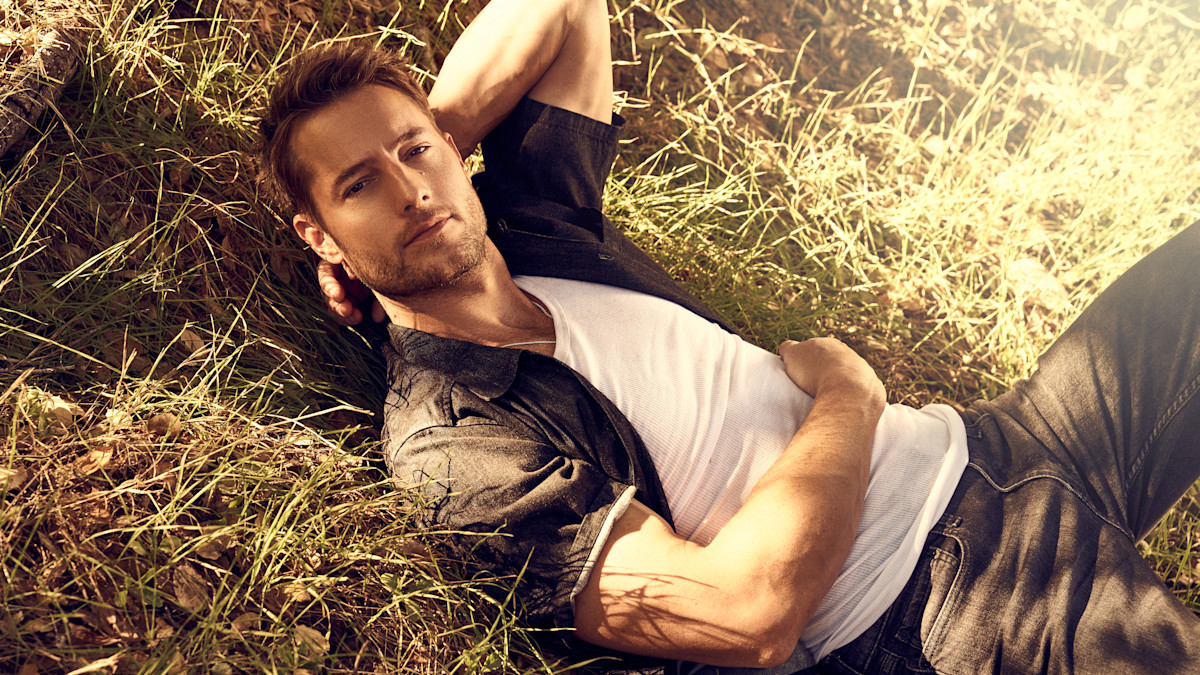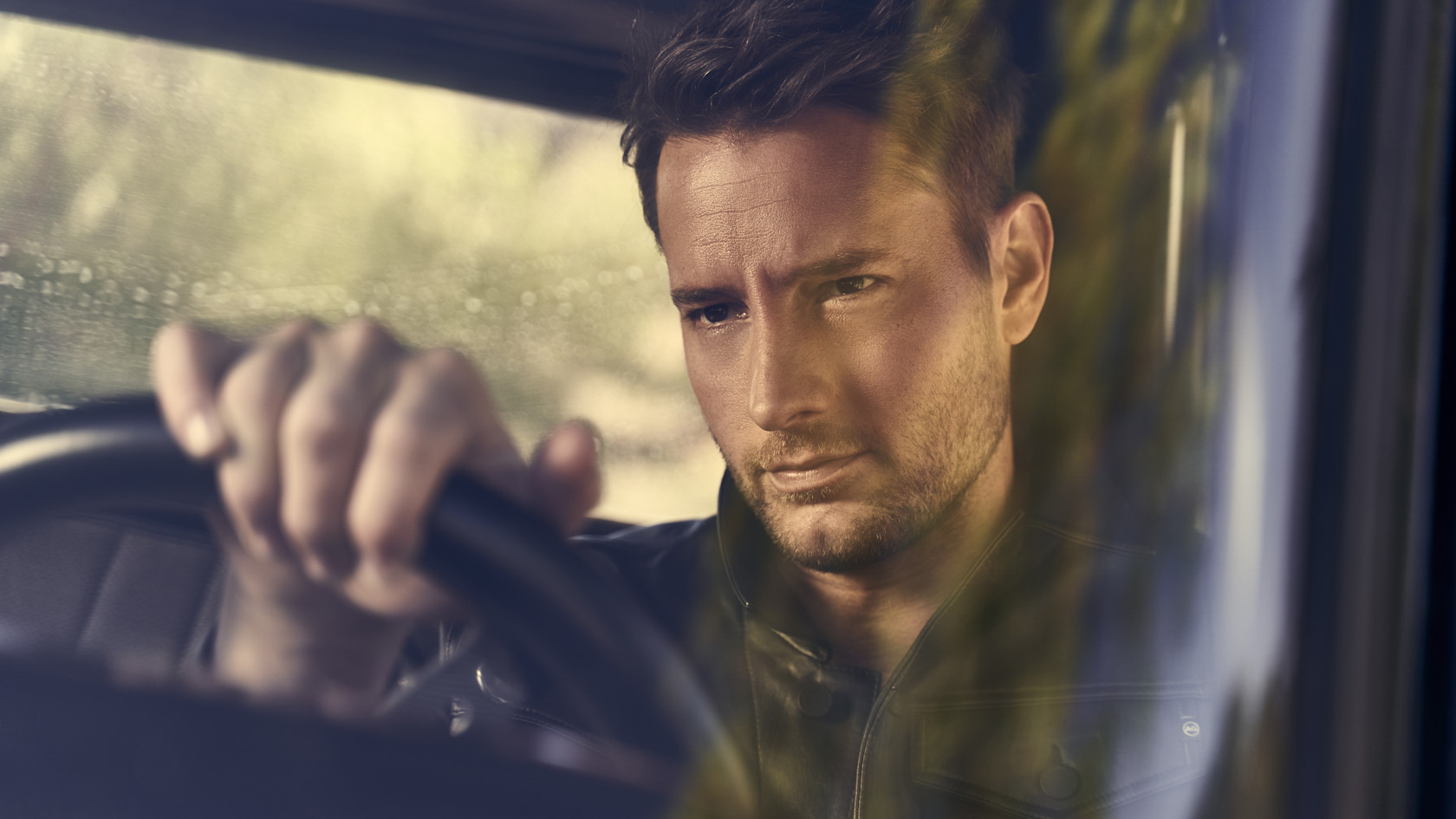
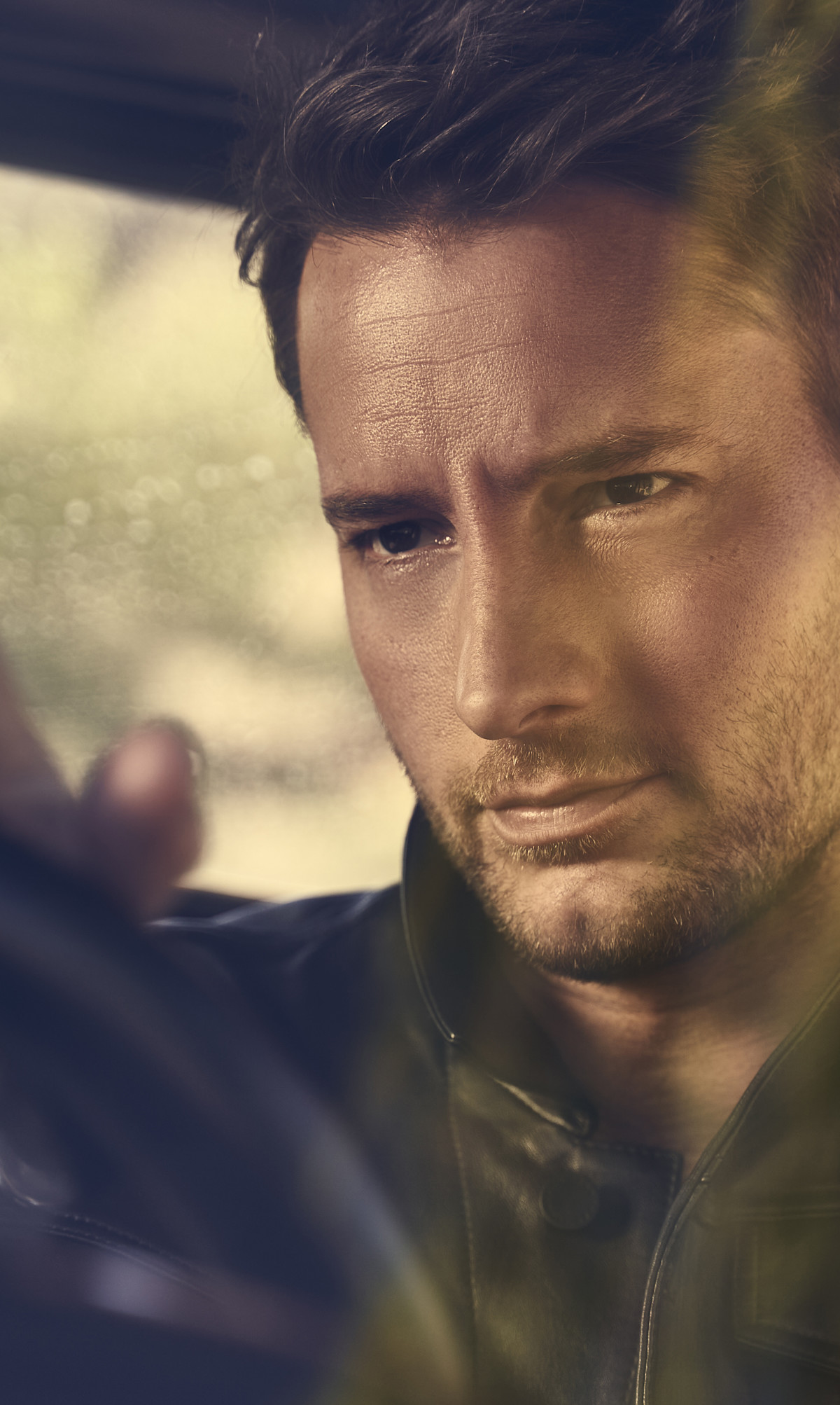


JUSTIN HARTLEY
Well Seasoned
As His Beloved Starring Role on NBC's Smash Hit Drama This Is Us Comes to a Close, Justin Hartley Takes Bite Out of Action, Comedy, and Roles Behind the Camera.
PHOTOS BY RANDALL SLAVIN WORDS BY TAMARA RAPPA
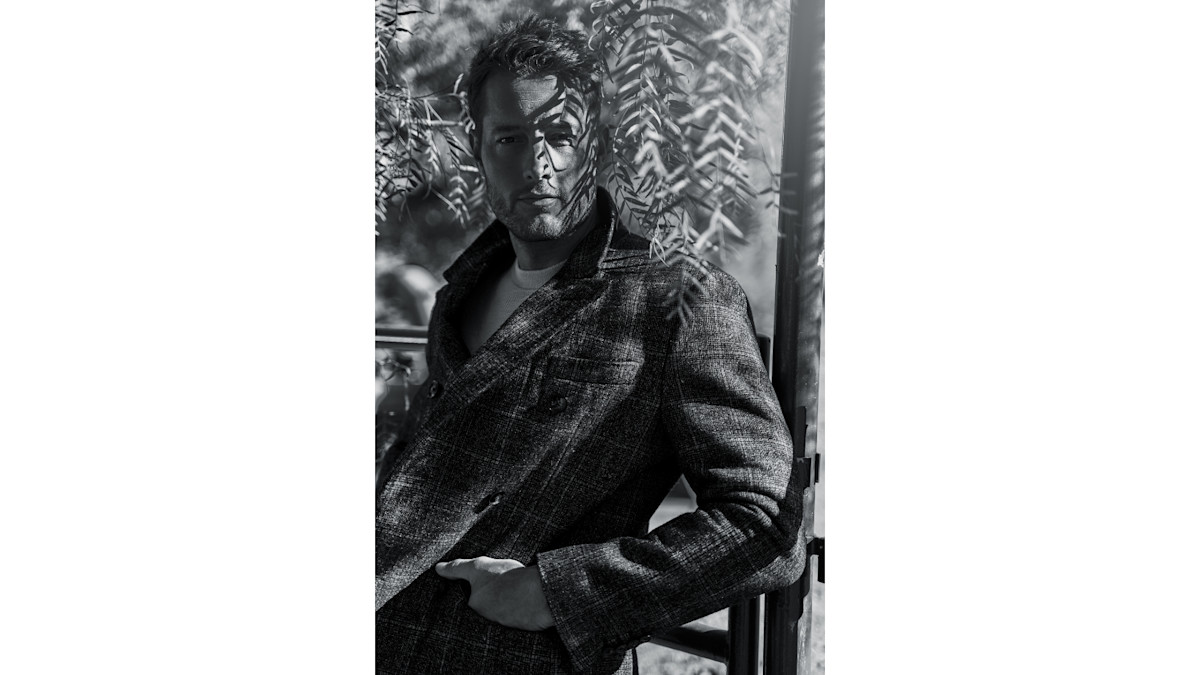
ABOVE PHOTO: AG Jacket; Calvin Klein Tank. THIS PHOTO: Teddy Vonranson Coat; Theory Sweater.
Listen to the extended interview on episode 92 of the Story + Rain Talks podcast on Apple Podcasts, Spotify, or wherever you listen.
Tamara Rappa: We had the opportunity to spend a little time together while shooting our January cover on set on a ranch, and you struck me as a very passionate person. Where does that come from?
Justin Hartley: Probably my parents, to be honest with you. I was always taught that if you're going to do anything at all, give it your all. I think it also comes from failure. Any time you do something that you're passionate about and you fail, you'll find that it leads you to something that you might be even more passionate about. And I think that begets more passion. That's how I tackle my life.
TR: When does being passionate not work? Are there pitfalls or things to be cognizant of?
JH: I think so. You've got to know when to let go. You have to know when to admit that the ship has sailed, that maybe you're not the guy for the role, that maybe you're not destined to do the things you imagined. There's a fine line between being passionate about something and beating a dead horse.
"Any time you do something that you're passionate about and you fail, you'll find that it leads you to something that you might be even more passionate about. And I think that begets more passion. That's how I tackle my life."
TR: You grew up outside of Chicago, with many siblings. Where did creativity reside in your life? When do you think the desire to be a storyteller through acting, producing, writing and directing, take root?
JH: This sounds like such a lame answer maybe, but I've always enjoyed the feeling you get from making someone laugh. When someone's laughing, they're out of control. They're out of themselves. Whatever is going on in their life that might be negative, they've forgotten about. The mouth gapes open; people slap their hands on their knees. It looks like my dog in the morning when I go to feed her. I've always enjoyed knowing that whatever I'm saying or whatever I'm doing, is having an impact on a person's life, making them feel good or laugh. So I think it probably came from comedy. I'm not the funniest person in the world, but I enjoy comedy.
"I have grown to love soap operas, the daytime community, and the actors that work in the genre. It's one of the things I love to talk about."
TR: The power and the ability to change the energy.
JH: ...And there are people who are the opposite of that, and we all know them, we've encountered them. Hopefully you get them out of your life. There are people who come into a room and they literally suck the out the energy. It's terrible, like a vacuum. It’s hard to counter that, but it’s good to be the other person, walking into a room and plugging in holes wherever you feel it might be lacking. Maybe you can contribute.
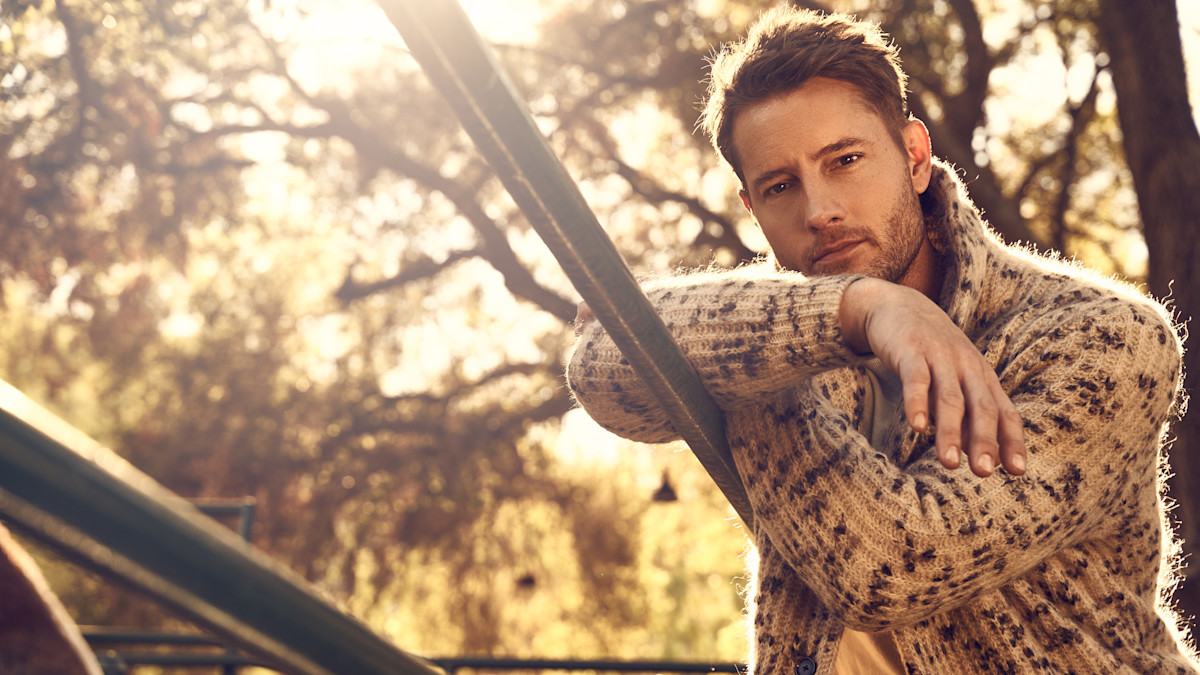
OTD Cardigan; Canali Sweater.
TR: You studied theater in college, and then you came to LA, where you landed your first acting role on Passions. How did you find your way into the world of soaps?
JH: Listen, I'll be real with you. It was just a matter of whomever was going to give me an opportunity at that time. I have grown to love soap operas, the daytime community, and the actors that work in the genre and the work that they put in. It's one of the things I love to talk about. In fact, I have a couple of projects that have to do with daytime television that I think could be really great. I came from a place where, I didn't know it at the time, but I didn't have any talent. I didn't know what the hell I was doing. I didn't know that whatever I was doing looked so different or bad compared to the actors I'd revered or respected, or wanted to emulate. I couldn't really see the difference, performance-wise, in how I approached the work. I got really lucky. Jackie Briskey was casting director. Jackie gave me my first opportunity on Passions when she cast me. I don't know what they were thinking. I don't know what happened. I don't know what was going on, but they cast me. I will say this about myself, I do know this. I know that I got better, a lot better, at a really rapid pace. You're there about three weeks before what you're filming actually starts airing. What really turned it around for me, was when I first saw myself on screen. I started to realize what kind of a person, actor, and artist I was. I wasn't enjoying my performance, not that it wasn't a good performance, but you would think I'd be feeling, 'This is the first time I'm on television, it's kind of a big deal. This is really cool'. Yet all I was doing was picking it apart. I was literally taking notes instead of looking at it like the fun opportunity it was. I thought, this is something I enjoy, that I want in my life, and that I want to continue to do for the rest of my life. So how do I become great? How do I become the best? What do I do to put myself in the best possible position to be able to continue to work throughout my entire life? That happened right away.
"I think it's just wonderful that someone can think, 'I'm wiling to sacrifice this, and this, because I love the art so much, I have such a passion for it. This is how I prepare, this is what I do.' And damn it, it works! [Jeremy Strong's] good. So I don't know how you can argue with someone's process."
TR: You went on to become a seasoned soap opera actor, having been both on Passions and The Young and the Restless. How is soap acting and prep different from other types of acting projects, and what do you think people don't know about the genre?
JH: There are so many things that are similar, and there are so many things that are different. The prep is so different. My wife and I have actually discussed this, because she's done soap operas as well. We've talked about it and how the prep is so different. Television and movies are different in general, because in movies, you get some time. In television, you get very little time to prep. In daytime television, there is no prep. You better be ready. You get your script maybe three, four, five days in advance. You're coming in every day, you're shooting six shows a week, you're always behind, and I think anyone that tells you they're not cramming the night before is lying to you. On the show that I'm on now, on This Is Us, and on any primetime television I've done, you get a little more time. I don't remember ever cramming the night before. I always try to get my stuff done in advance, because I've never been able to work on the material until I have the lines memorized. Memorizing the lines takes time, but once you do that, once you have them, at least for me, anyway---I can actually start working on it. If I'm in the scene and trying to think about the lines...come on...that's not how we’re talking right now, right?
TR: What do you think people may not realize about soaps?
JH: Something that people don't consider, is that there's no one that can sustain being on a soap opera for a long time who is not talented. There are people on soap operas that come and go. They come and spend a year, or two, or three, and they just can't hack it, and they leave, or get fired. Anyone who's been on a soap opera, a daytime television show, on every day for years and years and years, not the people who left because they got other opportunities or because they couldn't hack it...these are all talented people. The hard work, the hours that go into it, the grind, is also something people probably don't think about. I don't know how many soap operas are left, there are three, four, or five, something like that, left. When I was on Passions, I think there were twelve. Working on a soap, you're also able to have a pretty traditional and typical 9 to 5 kind of schedule. You can have children and a family, all of that kind of stuff. It allows for that kind of a thing, for the actors that want that kind of thing. You're working in LA and coming home every night. You're not on the road. You're not traveling. You're not on location. it's completely different from what most other genres of acting can provide.
"It allows me to start my day off thinking about my place in the world, how insignificant it may seem, but how significant it really is."
TR: In terms of preparing yourself for your work, either daily or on a larger scale, are there any rituals and practices you have?
JH: I do a few things. It changes with the role. I've never been the kind of person who, if my character is a loner, I need to be alone for three months or three weeks. I can turn it on and off.
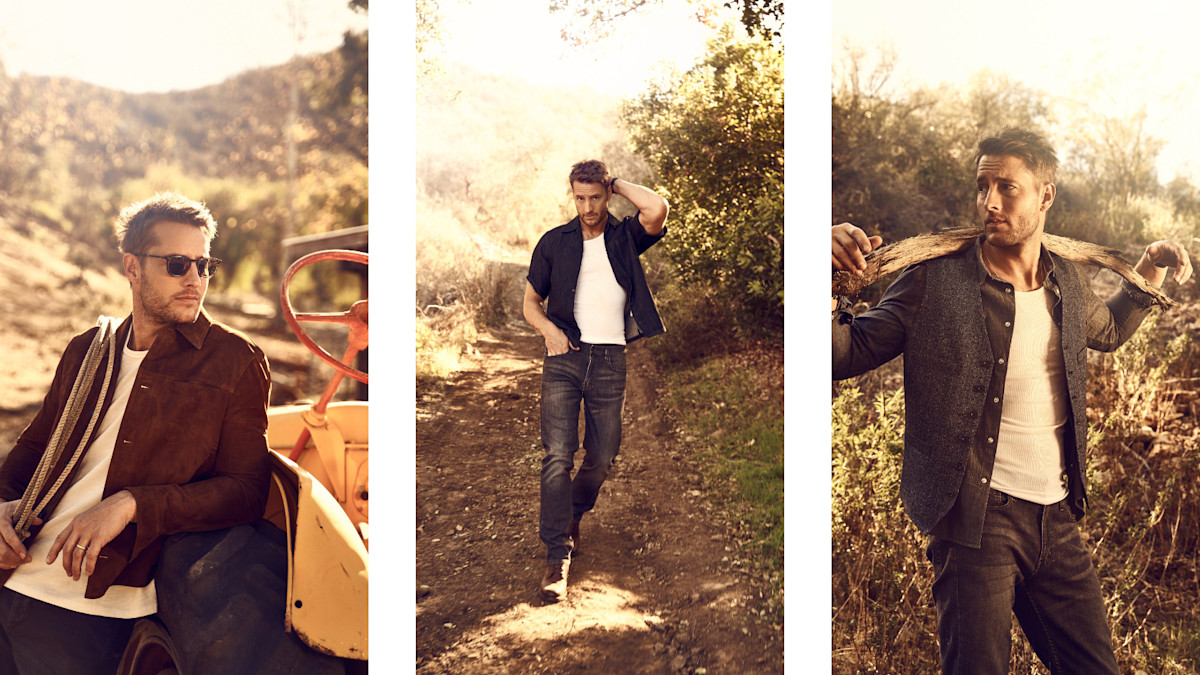
OTD Jacket; Rag + Bone T-Shirt and Jeans; Garrett Leight Sunglasses. Teddy Vonranson Shirt; Calvin Klein Tank; Levi's Jeans; Wolverine Boots; Omega Watch. OTD Shirt and Vest; Calvin Klein Tank; Levi's Jeans.
TR: I was just reading an article in The New Yorker about Jeremy Strong on Succession, and his method.
JH: I read that article, and I'll tell you what, because I direct as well, and I produce---I respect everything he said. It seems like the guy just knows. I don't know him, but it seems like the guy knows how to prepare, and what it takes for him to be excellent. I respect the hell out of that. I think every actor is different. I love it. I think it's just wonderful that someone can think, 'I'm willing to sacrifice this and this, because I love the art so much, I have such a passion for it. This is how I prepare, this is what I do.' And damn it, it works! He's good. So I don't know how you can argue with someone's process. We're all different, right? We can agree on that. Some people slide into a role easily; some people like to do more prep; sometimes people are lazy, they don't want to do the prep and it comes across in the work. No one can ever accuse him of that. I think it's great.
"I have a lot of interests and I have a lot of energy. I'm also striving to do better. Not that I'm not at peace and I don't give myself time to think about how great the show is."
TR: You told me about a Carl Sagan speech, Pale Blue Dot, that you listen to every morning. How did that ritual begin, and and how does it help you and your wellbeing?
JH: Pale Blue Dot is this really famous speech, a point of view from Carl Sagan. My dad is a massive astronomy buff and nerd if you will, so you'd think I would've heard it growing up. If I did, it went in one ear and out the other or I was too young to hear it. My wife sent it to me when we were dating. I've never asked her why she sent it to me. She sends me things, all the time, that are really profound and wonderful and cool. She's such a giver. For example, we send each other song lyrics. I've never asked her why she sent it to me at the time, maybe I should. I listened to it, and never heard anything like it. It gives perspective, every time I listen to it. I've probably listened to it, at this point, a thousand times, maybe more than a thousand times. I have it all but memorized. It allows me to start my day off thinking about my place in the world, how insignificant it may seem, but how significant it really is. It's such a fleeting little time here. The impact that you can have on other people; the things that don't matter; the importance of being kind; the importance of making sure you do hold someone's hand when they need it, the importance of accepting compliments, or accepting help when you need it. We are part of a community, and it's gone like that. But you can have an impact. A lot of people listen to that speech and think it's so depressing, because it's basically saying we're meaningless. And I go, 'No, it's actually not at all depressing'. In my opinion, it means that the fraction of a moment that we're here on earth is so tiny, yet people can have such a massive impact. That's a very special thing, and makes every life extremely significant.
TR: What's interesting is that your wife sent you this speech that's come to be so important to you, this area of study happens to be your father's passion, and this final season of This Is Us starts out with the 1986 Challenger explosion, and how your character Kevin is confronted with death for the first time because of it. It all feels linked.
"I get inspired by people who do things that I can't do."
JH: Yeah, it's crazy. I'm going to ask my wife now, I have to ask her exactly why she sent me the Carl Sagan speech. And my birthday is January 29th. Did the Challenger explosion happen on January 28th? It was right around my birthday. We shot the pilot of This Is Us off-cycle. There's a pilot season when all the pilots are shooting and ours was shot before that, in January. I'm giving the speech in the pilot episode, about the Challenger exploding, basically tying it to having a meltdown. Kevin's going to explode, he doesn't know where he is in life. It's a crazy time for him, and it's his birthday. I think we filmed that on the anniversary of the Challenger explosion. It was either on that day, or the day after. That's crazy, right?
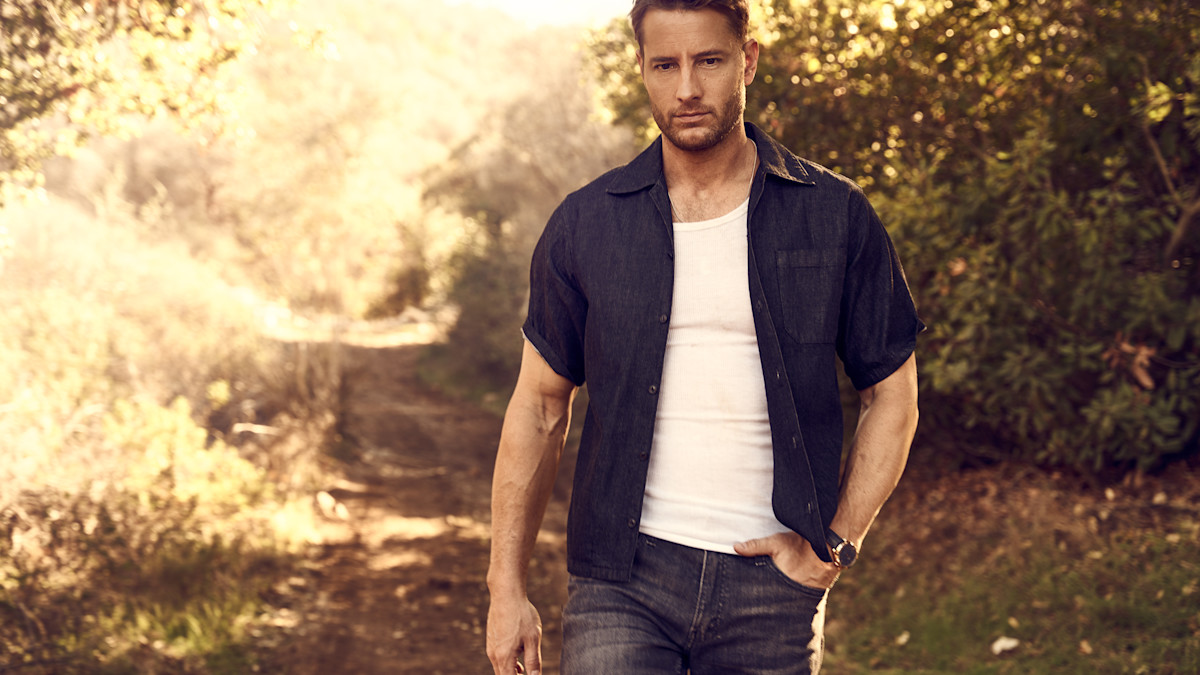
Teddy Vonranson Shirt; Calvin Klein Tank; Levi's Jeans; Omega Watch.
TR: What keeps your creative juices flowing?
JH: I have a lot of interests and I have a lot of energy. I'm also striving to do better. Not that I'm not at peace and I don't give myself time to think about how great the show is, and the accomplishments I've achieved and have been lucky to have achieved. But it's not enough. You're always looking for something. Come on, you're always looking for something more, right? Honestly what keeps my creative juices flowing, is that I get inspired by people who do things that I can't do. I really do. People that sing, especially guys that I know, friends of mine, who can sing. I'm talking about things like really playing a guitar, really playing the piano. It's so inspiring to me, personally. I have a 17 year old daughter, and when I see Isabella do it, I get even more inspired. I think, 'Look what you can do?' It's wonderful. I could watch something I know nothing about. I could watch a master, fill-in-the-blank, architect...a subject I know nothing about. I could watch someone talk to me about a camera, I don't know much about that. I could listen to an expert on pretty much anything and be completely inspired.
"You try to keep yourself focused on not working just for the sake of working, while trusting yourself and believing that you have good taste."
TR: How do you manage and balance the expectations placed on you both as an actor and a star, with staying creative and inspired? Is that ever a struggle?
JH: It's a struggle. It's not something I think about regularly, because fortunately I'm working, but I think it's something that might set in if I wasn't. It has, in my past. God, how do you manage it? You try to keep yourself focused on not working just for the sake of just working, while trusting yourself and believing that you have good taste. I know what's good and what's not good. Even though if there are four slices of the pie, two of them might make sense, and the other two might not make sense. I don't get the character. I don't like the story. It's tough when you're an actor, because it's not like you're turning down one job because there's another one and you're trying to figure out which one is better. Sometimes it's feast or famine. Am I going to do this job for the money, or am I not going to work and make zero money? You have to save your money. I think it's about trusting yourself, trusting your taste, and enjoying the ride.
TR: You've had roles in over a dozen films and many roles on series, including roles on Smallville, Revenge, and Mistresses. How did you end up writing an episode of Smallville?
"I'm not going to lie, I think I wrote a 50 million dollar episode of Smallville. It had everything you can imagine! It was massive. I wrote Star Wars."
JH: I think I tricked them. Here's the full story. I was going into, I think, season nine of Smallville, which was my fourth season or so. I'd been there for a while, and was witnessing these actors on our show direct episodes. I was in a meeting with our show runners and said, 'Hey, listen, you have these actors on our show that have directed episodes'. And as I started to ask, to request what I wanted, they said, 'Yeah, no problem. Don't worry about it. Next year. You can direct next year. Next year's great.' That is not what I was going to ask them, but I thought, I will absolutely take you up on that. Then I said, 'My question was going to be, have you ever had an actor want to write an episode of Smallville?' And they both went pale. At the time I didn't realize what it entailed, to be quite honest with you. I thought, you write an episode, people are going to help you with it, and they'll tell you what's good and what's bad. You change a few things, and here we go....I had no idea what I was getting into. They told me they hadn't had an actor want to write an episode. I said, 'Let me ask you a question, if I wrote what I thought should be the premiere episode of Smallville this year, would you read it?' And Kelly [Souders, showrunner] said, of course I would read it. I pulled it out of my bag and said, 'Here you go. That's how I spent my summer. I wrote it.' They read it and she calls me in 30 minutes or maybe three hours, whatever it was, and were like, 'Oh, you're a writer'. I said, 'I'm not a writer. I can tell a story.' And she's like, 'No, it's good. It's really good.' I think she thought it was good because, I'm not going to lie, I think I wrote a 50 million dollar episode of Smallville. It had everything you can imagine! It was massive. I wrote Star Wars. They gave me an opportunity later that year to co-write another episode.
TR: Was it a fun summer of tackling that writing?
JH: It was. At the time, I was into it. I wanted to do it. I thought it was good. It's that passion thing! When I start to hone in on something, I obsess about it a bit.
"I've never liked directors coming in for an episode or two a season and telling me about what my character does or does not think about something, because I live with this guy every day."
TR: You've had opportunities to direct, including This Is Us. What do you get from directing, that you don't get from acting?
JH: It's such a different thing. At the risk of sounding cheesy, it's just a different lens. You're watching. You're responsible for different things. Directing is interesting because you probably know the script, or should know the script, way better than all the actors know the script. There's also this idea I like to implement when I direct: that I don't know the character nearly as well as the actor knows their character. When you're talking to the actor, you might be talking to them about the scene as it relates to the episode, but I think there's a pitfall, as a director, in talking to an actor about what their character would and would not do. And I've never enjoyed that as an actor myself. I've never liked directors coming in for an episode or two a season and telling me about what my character does or does not think about something, because I live with this guy every day. It's not a good way to break through to actors. Directing makes me a better actor because you realize how many responsibilities a director has, you get to know the things you don't really think about when you're acting. As an actor, you're showing up, and you're responsible for your character and your scenes. There's really no way you can impact scenes that you're not in, right? As director, you're responsible for everything. It makes you respect the job of the director, the writer(s), the producer(s), the line producer(s), the grips, the gaffers, the DP---everybody, a little more, when you're able to see things from that perspective.
"When you're given the opportunity to play a character like that, and your performance is received the way mine has been received, I would have to honestly say that it was the turning point, it was when people were taking me seriously."
TR: You're an actor who is not just a pretty face. I bring this up because I'm sure you've had to deal with this subject in a number of ways. You and your work have depth. You write. You produce. You direct. You're also an entrepreneur, with Revel Spirits, the agave spirts brand you co-own. When do you think people first began seeing the full scope of of who Justin Hartley is, both inter-industry and also your fans? If you could pinpoint an exact moment, or even scene that exemplifies that, what would it be?
JH: My gosh, well, thank you. I've always thought, whether you're on the stage, on at 1 in the afternoon or 10 o'clock at night, on NBC or HBO, streaming, Amazon, acting is acting. Work is work. Good work is good work. It doesn't matter where you are. If you're on a street corner doing a Shakespeare monologue and it's wonderful, it's wonderful. I've always thought about acting in that way. Although I will say, there are opportunities you get from being on a show like This Is Us and embodying a character that's so relatable. What I love about Kevin so much is that on paper, he's rich, he's famous, fill in the blanks....he's not really relatable to most people, right? Yet in a weird and ironic way, he is the most relatable. He could be arguably be the most relatable person on the show because of all the things he struggles with. At the end of the day, he's a guy trying to get by. When you're given the opportunity to play a character like that, and your performance is received the way mine has been received, I would have to honestly say that it was the turning point, it was when people were taking me seriously.
"He could arguably be the most relatable person on the show because of
all the things he struggles with."
TR: Can you tie that moment to a particular episode of This Is Us?
JH: They're all connected, they really are, and I love the way Kevin's been set up. He was this guy who seemed like a surface guy, selfish, didn't think about anything but himself. The onion starts to peel away. It took two or three years. There's this episode where he goes back to his high school, he gets invited to speak to the graduating class, they're going to honor him with an award because he was a quarterback.
TR: That was a great episode.
"You see a man and a shadow standing behind, just out of arm's reach, of
the man that he wants to be."
JH: ...And he can't handle it. He's trying, he's failing, and he's not doing anything he should be doing. At the same time, he's such a beautiful character because he's being totally and completely honest. You see a man that is just broken. You see a man and a shadow standing behind, just out of arm's reach, of the man he wants to be. He can't quite get there and he doesn't have all the right pieces. I thought that was such a beautifully written episode, wonderfully directed by Ken Olin, and I was lucky enough to be there. To think about where we discover him at the very beginning of the series, to that moment, the ultimate break, and to see him rebound and come back to where he is now, is cool.
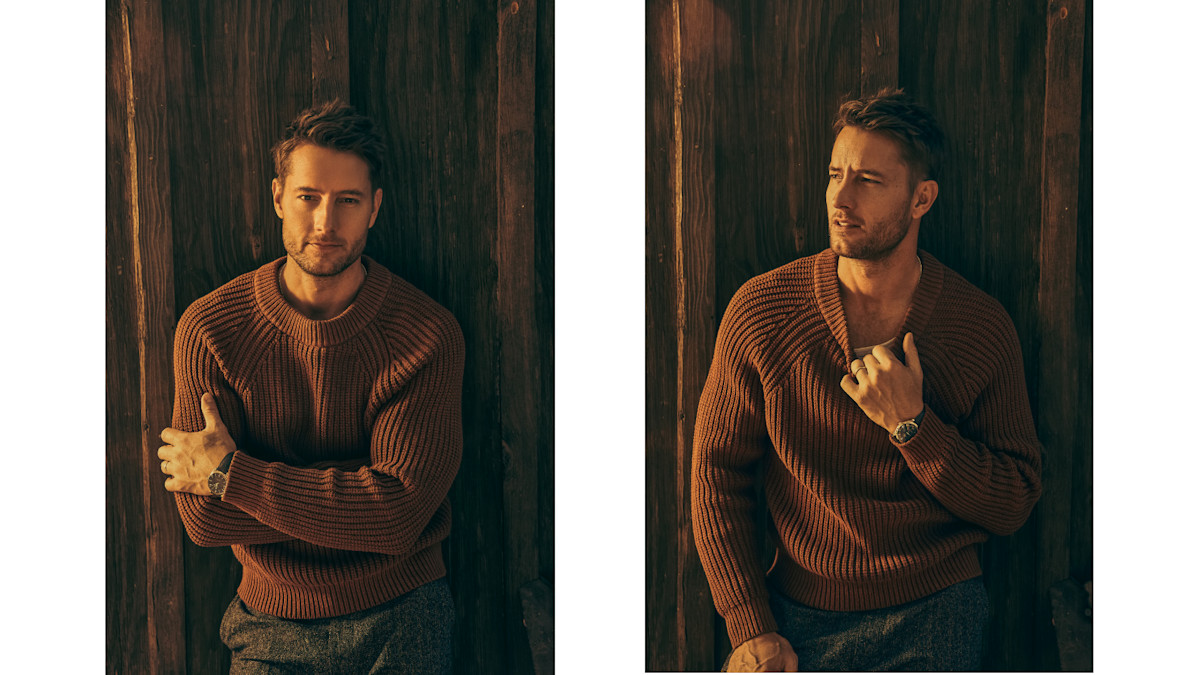
Teddy Vonranson Sweater; OTD Pants; Omega Watch.
"I thought that was such a beautifully written episode, wonderfully directed by Ken Olin, and I was lucky enough to be there."
TR: And there's a sillier side to Kevin, one we see in his role on television as The Manny. I had the tv on over the holidays, and I caught Bad Moms Christmas. In the movie you play a fireman that moonlights as stripper. You're so funny in it, and it got me thinking. Which came first, Kevin Pearson's shirtless Manny persona in This Is Us or Ty, the fireman stripper, in Bad Moms Christmas? I feel like both happened at the same time!
"I thought, 'What idiot am I for not thinking about this?' There's Kristen Bell, Kathryn Hahn, Mila Kunis, Susan Sarandon, all at a strip club watching strippers, including my character."
JH: They kind of happened at the same time. I think I'd shot at least the pilot for This Is Us or maybe even a whole season before I played that role. They both do have a great sense of humor. I had so much fun playing that character. I read that role and was like, 'This guy's hilarious. All he wants to do is make people happy, but he's a stripper.' That movie was really well done. It was fun. There was one thing I didn't think about when I took the role, it just didn't occur to me, and I thought, 'What idiot am I for not thinking about this?' There's Kristen Bell, Kathryn Hahn, Mila Kunis, Susan Sarandon, all sitting at a strip club watching strippers, including my character. On the day we went to film it, I was like, 'I am not a stripper. I've got to get up and strip, take my clothes off in front of all of these iconic women. What am I thinking?' It didn't dawn on me that I would actually have to do it. I read it and was just like, 'This is great, of course.'
TR: The scene where all the women are lined up in a row watching you. You seemed like a professional!
JH: Thank you. I remember that day well. The directors were so sweet and told me, when the camera's on the ladies, there's no reason for you to be off camera stripping, so take a break until the camera's on you. I was sitting at video village watching their characters' reactions, reactions while they were looking at nothing; they're such great actors. Then I thought, what if I gave them something to look at without telling them? For the next take, even though I was off camera, I decided, let me do this. I'll do all kinds of stuff and see if I can get a reaction out of them. It ended up working out.
"I think about that all the time, actually; how strange it is that I've played this character who, in certain ways, was going through the things that I, myself, was going through in life."
TR: This Is Us debuted in 2016, it's ending this season with season six. Iconic television was created. I think the series has 234 award nominations and 55 wins...so far. You've been working as an actor for years on many series, soaps, and films, but things really blew up for you in 2016. That year, you were nominated for a Daytime Emmy and that's when This Is Us started airing, to huge popularity and success, with people falling in love with your character. Is it interesting to take part in an art-imitates-life, life-imitates-art role? Over the course of This Is Us, we see Kevin become a famous actor, much like what had been going on in your own life at the very same time.
JH: Crazy; it's been insane, the parallels, his career versus my career. A lot of Kevin and I are so different, of course. I think about that all the time, actually; how strange it is that I've played this character who, in certain ways, was going through the things that I, myself, was going through in life. I was able to do research by just being myself. But I've always said, if Kevin wins an Oscar before I do, I'm going to be really pissed off. I know I work harder than Kevin Pearson. It's crazy, isn't it, how life does really imitate art? People say that and you think, okay, whatever, you're reading into things. Of course it does, because it's the way you want to see things. But it really does. It's bizarre.
TR: Over the course of the show's several seasons, we discover the many layers that make up Kevin. Is there anything that you fight for or have fought for in your portrayal of him?
"I've always said, if Kevin wins an Oscar before I do, I'm going to be really pissed off. I know I work harder than Kevin Pearson."
JH: Gosh, Dan and the writers are so generous. This medium is a writer's medium. They could basically tell everyone to shut up and do whatever they want. They're very talented. And they include us, they don't have to, but they do. I've always fought for and continue to fight for, not 'fight' as much as let everyone know, that I really enjoy and think it's important and necessary in the stories we tell, especially with Kevin, to keep the humor. He has a way of joking about things without being condescending and without being cynical. He's honest and he's true. Someone will say something, and even in the way he goes, 'Huh', it's not cynical. It's not him being dismissive. It's him just repeating or maybe asking that person to think about what they just said. He does it in a funny way that's disarming. I think it's important to keep that aspect of Kevin, to weave it in, because he can also be very abrasive and direct, and come off cocky and arrogant. Then there's all the stuff about his family, how much he cares about his brother and sister and mom, how he remembers his dad, and Sophie, the love of his life. I think it's so cool that there's this guy, 41 years old, a grown man, who's been in love with the same girl for over 30 years. It's great, right?
TR: It's great. I think a lot of people can see themselves in that. I think there are probably a lot of people out there who have this person they've always held a torch for.
"I really enjoy and think it's important and necessary in the stories we tell, especially with Kevin, to keep the humor."
JH: ...and have been connected to.
TR: And then life does something, things change, but there's always that feeling there. On this topic, I was thinking about the fact that you first got married when you were young, when you were 26. You remarried, and you recently got married again to someone whom you totally adore, congratulations. You and your wife seem to be best friends.
JH: We are.
TR: Would it be accurate to say that you're someone who loves love, and how does your experience, both in relationships and having raised a daughter who is now 17, how does that prepare you or inform you in your role as Kevin, Kevin who has a special bond with his sister, with his mother, with the girlfriends and almost-wives that we've seen him with?
JH: I do. I do love love. I love to be around people who love love, and I think Kevin is the same way. I also think he's starting to understand love, what it means, what it looks like, and what it feels like. He got married when he was really young and made some mistakes. Now he's older. I always say this about him: for the first time in his life he has the tools, the proper tools to complete the job. You can show up and have all the information, all the knowledge for how to build the house, but if you don't have the lumber and you don't have the nails, you're not going to be able to build it, right? Kevin has all the tools and all the supplies now, and it's just a matter of putting everything together. I think he really wants to. Hopefully he gets what he wants, and I also think he's easing up on the idea he has about what his perfect life would be. It would be three and a half kids, a white picket-fence house in the suburbs, a station wagon, one extra car maybe... Now he believes his life is going to be what it is, and it's going to be perfect for him. He's at peace with himself, which is nice.
"I do love love. I love to be around people who love love, and I think Kevin is the same way."
TR: I feel like you have a deep understanding of women.
JH: You think that I do, or Kevin does?
TR: Both.
"I've always been interested in what women have to say. It's a different perspective, and I think you're a better man when you consider it."
JH: Oh, I hope that I do. I adore women. I was raised by, obviously, the most wonderful woman, my mother. She's terrific. She's just fantastic. My daughter is wonderful. I have two lovely sisters. My brother is amazing too, but we're talking about women. My wife is the smartest, most beautiful, terrific, wonderful, loving person you could ever imagine. I've always been interested in what women have to say. It's a different perspective, and I think you're a better man when you consider it.
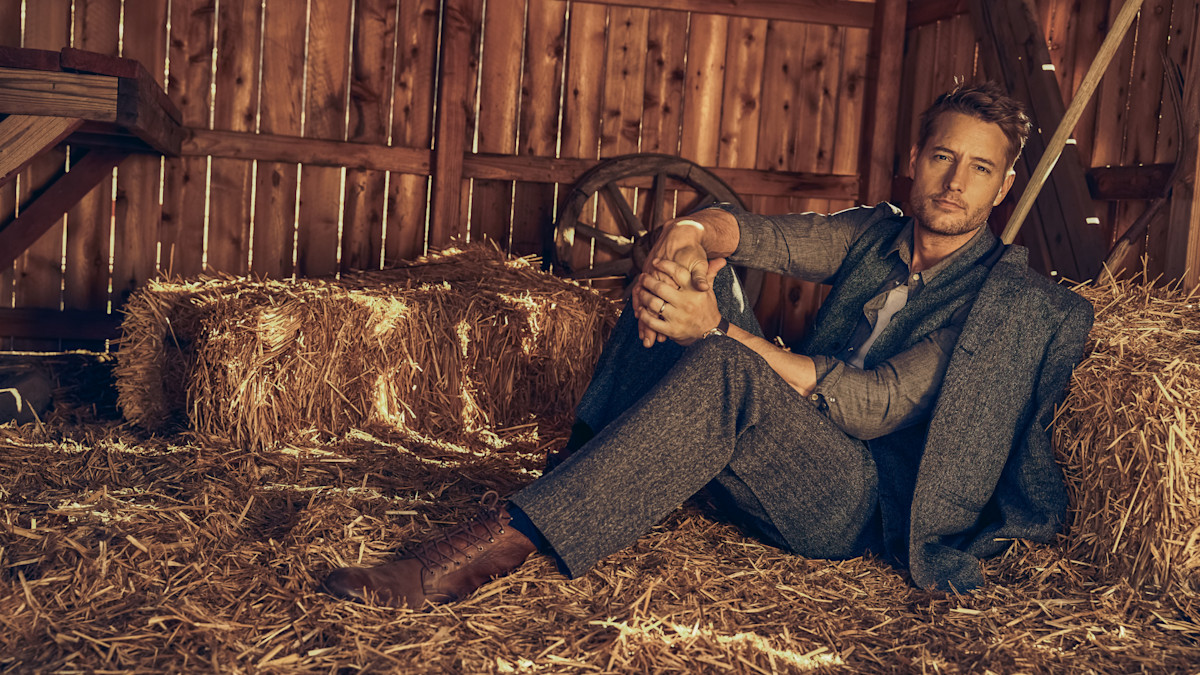
OTD Suit and Shirt; Calvin Klein Tank; Wolverine Boots; Omega Watch.
TR: I know you're in the middle of directing some episodes with Mandy and Milo. Is there anything you can share?
JH: It's been great. They're beautiful episodes. I can share that Mandy has a knack for it. I can share that Milo is fantastic at it, I can share that I learn from the two of them, and hopefully vice versa. We're doing a set of shows that intertwine. There are certain scenes in all three episodes that take place in the past, so both Mandy and Milo have to be in them at the same time, yet have to direct. So it's hard. You can't be behind the camera when you're in front of the camera, right? We all talked and I said, 'We're all in this together. Why don't you guys tell me what it is that you want, and I'll make sure that you get it?' If my younger self is on camera in those episodes and I'm not needed, I can sit behind the camera and make sure that Milo gets what he wants and that Mandy gets what she wants.
"I can share that Mandy has a knack for it. I can share that Milo is fantastic at it. I can share that I learn from the two of them, and hopefully vice versa."
TR: On This Is Us, Milo, plays your father and I wondered if that has influenced your friendship with him in any way. Is there a father and son-ness to your friendship, or is the polar opposite true because you are father and son on camera?
JH: It's more like brothers. I love him like a brother. I'd do anything for him, I think he's great. We laugh and we have a great time, he cracks me up, he's got the best laugh. It's hilarious, because when Milo's playing my dad on the show, he's actually younger than I am now. Mandy's character is an older woman when she plays my mother with me on the show. Then I see her, and forget. We did a couple of interviews yesterday. She's sitting right next to me, and I'm looking at her thinking, I never get to see her like this. I never get to be around her when she's just Mandy. I get to be around her when she's in all that makeup and the prosthetics. It's been amazing. I still pinch myself. I can't believe that I'm part of this show.
TR: Fans of This Is Us run far and wide. The announcement of the final season was a bit of a shock to fans at first. Now, people are really looking forward to and treasuring their time with This Is Us this season. What was the reaction to this season's first episode? Any notable friends of yours who binge your show have anything to say?
JH: I'm always amazed, maybe not during the first two years, but every year since, that people continue to reach out via text and say to me what an impact the show has on them and their family. We're talking all my friends, they have my phone number. But after six seasons, to still get those, really does paint the picture for how important this show has been to people, because people lose interest in things. It's just what happens, right? People get busy, and they lose interest. But our show evolves so much. It's a totally different show than what it was six years ago. It always amazes me when people take the time to send a text, especially after six years. It's really great.
TR: I was watching a cast interview recently, and Sterling told some very specific stories about how people have approached him about his character, that his character, Randall, was the catalyst for them quitting a job or having a baby. How have fans talked to you about how your character has specifically changed them?
"When you have grown-ups come up and tell you how important the show has been to their family and their personal relationships with their kids, their husband or wife, their parents-- it's really special. It just stops you in your tracks and takes your breath away."
JH: Totally. I had somebody walk up to me just the other day when I was with my wife eating oysters. A woman told me that she watches the show with her family and it totally changed her relationship with her daughter, in a good way. And I've had people walk up to me and tell me that my character convinced them to make that phone call to their dad, who they haven't talked to in 15 years. It's countless. They're all memorable. Just one of those moments would be overwhelming, and very humbling. The show is that impactful, that people feel the need to walk up to a complete stranger and say, 'Hey, I've got to tell you...' I've done it before myself, I've done it with athletes, especially when I was a kid. These athletes, when you're a kid, they're the ones that influence you the most, and send you on your way thinking you're going to become a professional athlete, which, of course...no one's going to become a professional baseball player...but that's what you think, right? But when you have grownups come up and tell you how important the show has been to their family and their personal relationships with their kids, their husband or wife, their parents---it's really special. It just stops you in your tracks and takes your breath away.
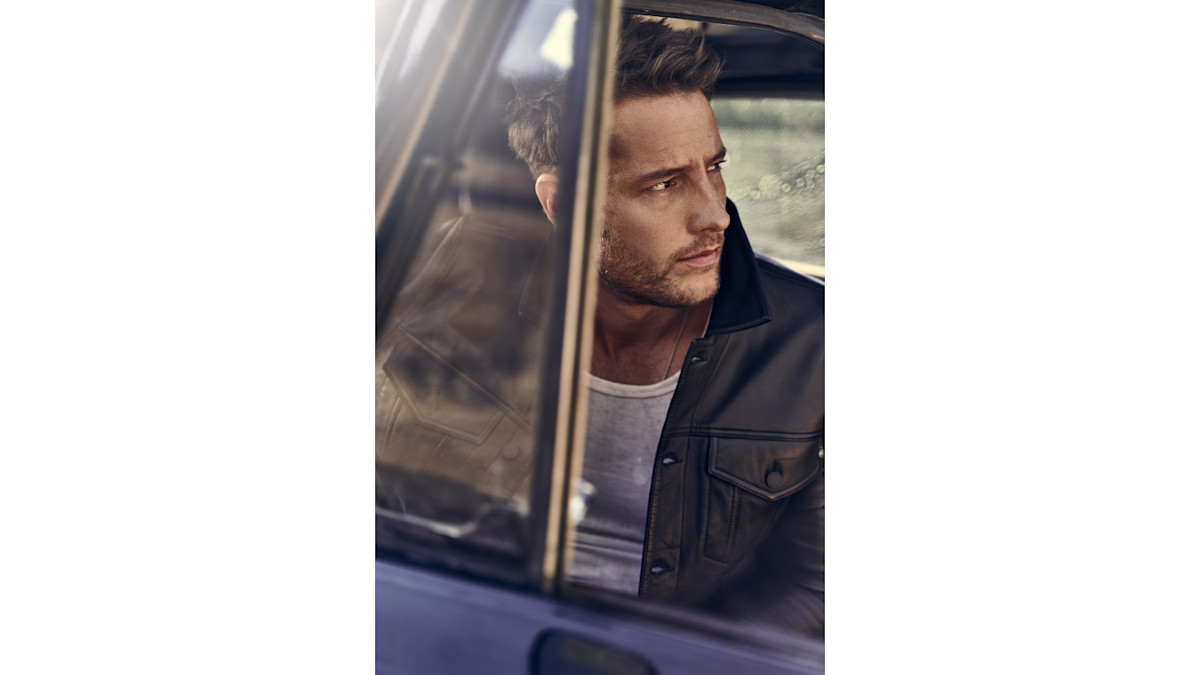
AG Jacket; Calvin Klein Tank.
TR: Kevin notably deals with alcoholism. As you wrap up the telling of Kevin's story, what else in your view and as a character, does Kevin most grapple with in life?
JH: Interestingly enough, I think it's self confidence, and I think he's getting better at it. He second guesses himself a lot, he's too much of a people pleaser, and he's afraid, not so much now, but before, especially. He's afraid to disappoint people even if he knows it's the right thing to do, and he's afraid that people won't like him, which is so dangerous. It's so dangerous to be afraid that strangers won't like you, it's such a dangerous thing, but that's his thing. That's what he grinds away at. It's also what makes him really interesting.
"It's not bad to have a perfectionist who is also supremely talented and
gifted, and that's Ken [Olin]."
TR: In the first episode of this final season, we see some of that self confidence stuff happening with Kevin as he navigates this new relationship with Madison.
JH: Yes I think so. Throughout the season you'll start to see things come up. Things come up in his life that bring back those old feelings, the second guessing of himself, the not knowing, all of it. But the way that he handles and deals with them build a little more confidence. The fact that he has these two kids, is a big thing. You've got to keep them alive, right? His handling of his relationship with Madison, the way he's going about it, the man that he's becoming, will l fill him up a little more. Being a man and being confident, knowing that what he's doing, what's in his heart, what he feels---is probably the right thing, as long as he's gentle. We're going to discover him finding that for himself.
TR: How have you approached what's next after this career-changing series? Are you open to all opportunities? Is being pigeonholed a concern? Are you looking for the opposite of what you've just experienced? What's guiding you right now? You've got a lot of coals on the fire, as they say.
"I'll make sure that the culture from This Is Us bleeds over into The Never Game with the crew, with the cast, with the directors, and with us as producers."
JH: I just want to do things that I like. I have this business partner that I work with, she runs my company, she's amazing and we always talk about what we want to produce. What are we interested in? When people come to us with stuff, or we're looking for stuff, what do we look for, what do we say yes to? What do we say no to?" And it all comes down to what we like. What do we watch? Is this something we would be fans of or want to star in? That determines whether or not we take on a project, and it's also going to determine whether or not I take on any project, whether it be acting, directing, or producing. If I like it and I'm excited about it, if I'm interested in it, if it's something I would watch, or something that I think is important, then I will shift my passion and become super obsessed with it. It's part of my personality. Whether it be comedy, drama, it doesn't matter to me, as long as it's something that really speaks to me, something I really love, and will enjoy doing.
TR: Your production company, Change Up, is off to this huge running start. You have The Never Game, which you're working on with Ken Olin, also huge part of This Is Us. What is Ken like to work with creatively, how do the two of you mesh creatively, and what will you take with you into the project?
JH: Ken and I work really great together, and I think he would say the same. Talk about passion. That man cares so much about the story and the performance and the way the show looks. He is a perfectionist. It's not bad to have a perfectionist who is also supremely talented and gifted, and that's Ken. He's one of those guys that just gets it. He understands everything. He's a really smart guy, hilarious and pithy. He understands my strengths and my weaknesses as an actor...hopefully more strengths. It's good, because he can protect you from the stuff that you might be not so good at, and accentuate the stuff that you're better at. So I'm looking forward to it. It's a different character for me. I haven't done any action since Smallville. I've been itching to get back into the action stuff. And I'll make sure that the culture from This Is Us bleeds over into The Never Game with the crew, with the cast, with the directors, and with us as producers. It's going to be that. It's going to be that energy.
"I met Rebel [Wilson] on this project. I didn't know her personally before that. I roll onto the set, and she is as advertised: funny. The woman is supremely talented."
TR: Is action stardom in your future?
JH: I would be open to it. I've always enjoyed it, stunts and things like that. I'm a pretty physical guy and I can move around pretty well; I can pick things up and throw them, work with guns. I'll definitely get a chance to do a lot more of that in The Never Game.
TR: Tell me all about your upcoming film, Senior Year with Rebel Wilson and Alicia Silverstone.
JH: I met Rebel on this project. I didn't know her personally before that. I roll onto the set, and she is as advertised: funny. She understands comedy and timing, just where to place, not only certain words, but accents, and even what's in her eyes. She can tell a joke without saying a word. The woman is supremely talented. She just gets comedy, she just gets it. You'll read a scene and think, okay, this is really funny. This is really going to work. This is hilarious. There's no way to mess this up. This scene's hilarious. And then she'll do it, and it's elevated beyond the great writing. She's incredible. We had a really good time. The story is great. There's singing, there's dancing, there's comedy. It's crude. It's rude. It's sweet. It's poignant, and it's a great ride. And it's funny.
TR: The elegant, thoughtful, and intelligent portrayal of serious issues and unique storytelling POV of This Is Us are unparalleled. As you move forward in your career, what secret sauce unique to the series do you know in your heart could never be replicated in your career again? What's locked in time? What's that special thing you'll reflect on for years to come and miss forever after closing this chapter?
JH: That's a wonderful question. That can be a really depressing question as well. There's part of me that wants to go, 'All of it. It's the best job I'll ever have. That was the peak.' And then, there's part of me that goes, 'No, wait a minute.' Milo said something the other day: it doesn't mean that you stop trying. When you have something in your life that you're lucky enough to have loved so much that you miss it---that's a privilege. It's something a lot of people don't have. What you can carry from that, forward, and how it influences the rest of your work, is that you're always striving for it. Lightning in a bottle twice does happen, but whether I get that or not, every show that I'm ever on, lucky enough to be on, will be special to me. I'll make sure of it.
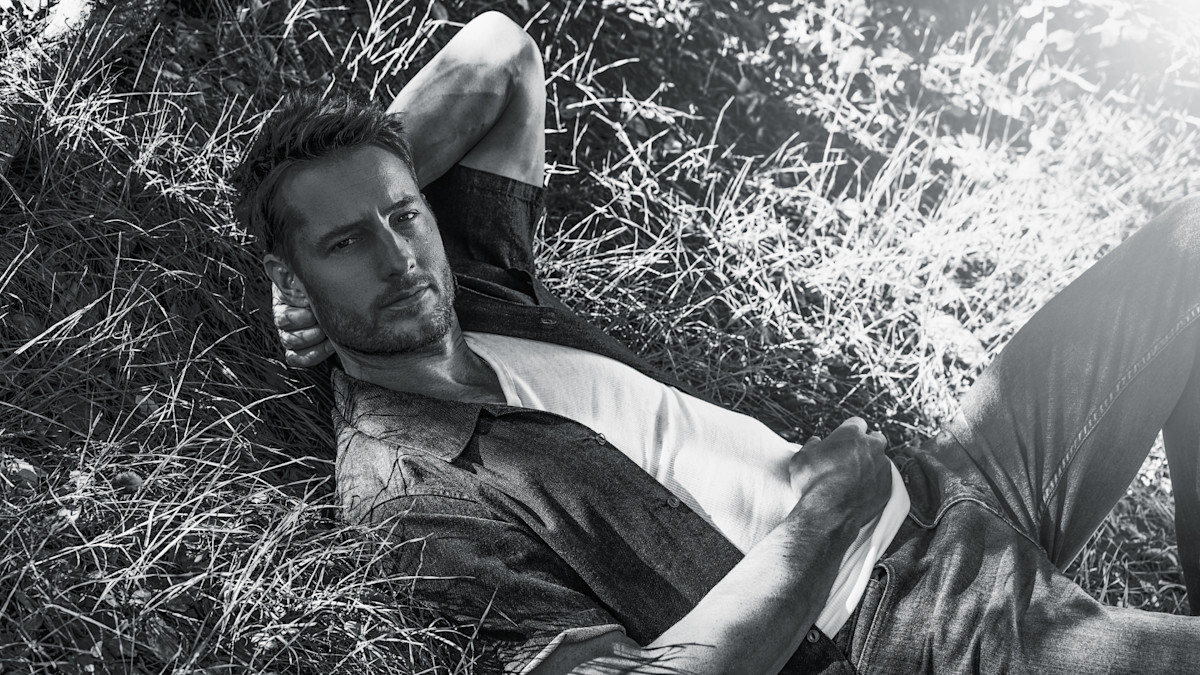
Teddy Vonranson Shirt; Calvin Klein Tank; Levi's Jeans.
"I couldn't live without my relationships with my wife and daughter. I have a wonderful relationship with all of my siblings and my parents. I don't know what I would do without that. I'll cherish that, because like I said, life comes and goes so fast, right?"
"I have a drive and passion for the arts and for acting, and even music. I'm not musically inclined at all, but I have a passion."
"I really enjoy my relationship with my friends and hearing about their lives and how well they're all doing, and how thoughtful they are about their wives and their kids. I am so lucky to know so many and be friends with so many good men."
"What I've discovered most about myself, in developing Revel Spirits is that I trust my intuition. That's a good idea--- trust yourself."
"I was at a jewelry store and they asked if I wanted an espresso and it was the most amazing espresso I've ever had in my life, and I've had a lot of coffee. I already have a built-in Wolf coffee machine at home, but when they said it was Nespresso, I went online and I ordered one right away."
"My wife and I are obsessed with oysters."
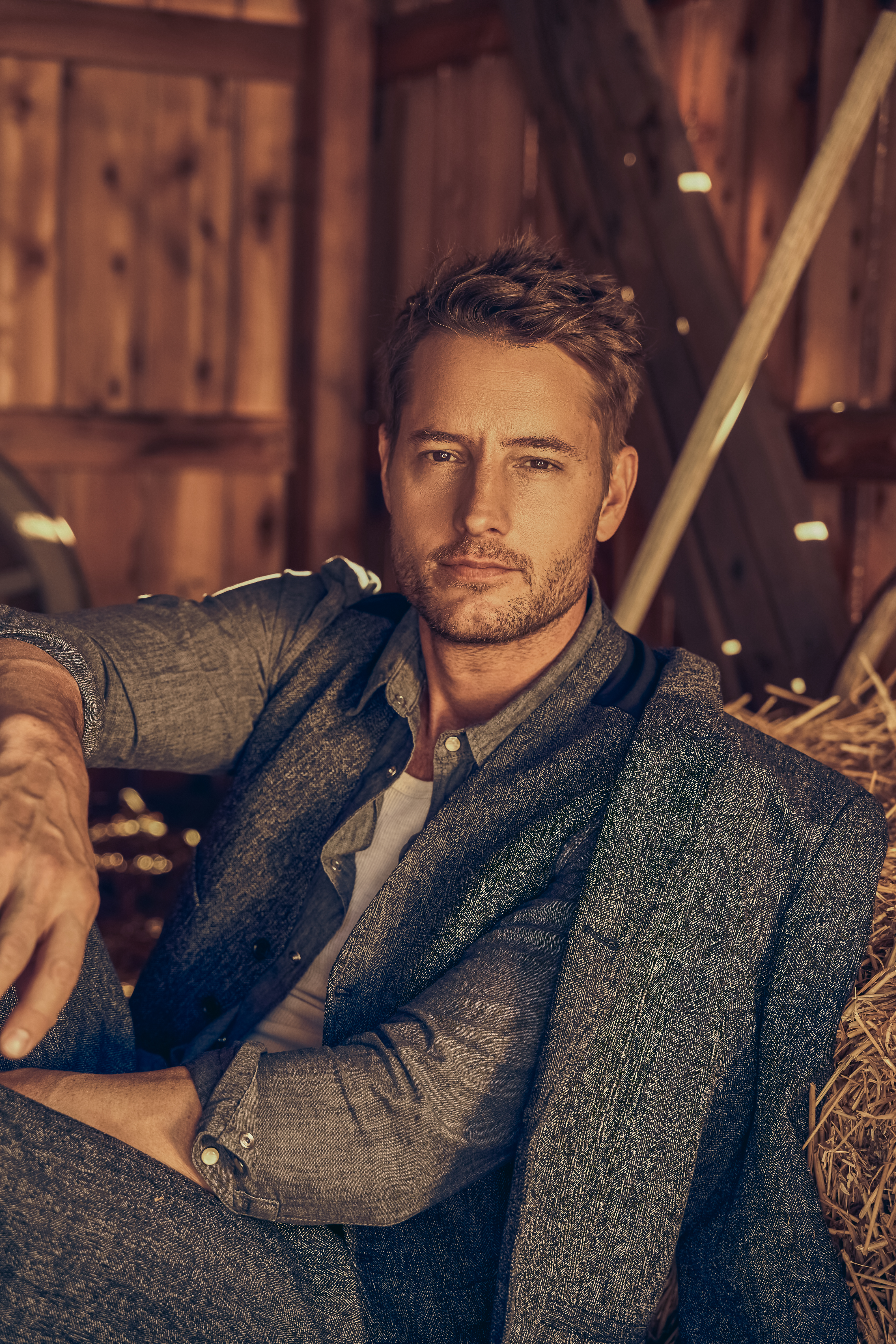
"I started off with a very textured haircut on Justin as that is an important foundation to all hairstyles. Hanz De Fuko Claymation is meant to be emulsified in your hands, warming it up with friction before applying. I massaged Claymation into the sides of Justin's hair, working my way to the hairline, where I focused mostly on the ends. Finishing with R+Co Outer Space Hairspray over all his hair. This gave a nice hold with a little flexibility to move around through the day. I applied the SkinBetter Instant Effect Eye Gel under Justin's eye along the bone line. Beginning at his temple and blending inward. I let the gel soak in to reduce any puffiness. I then applied the SkinBetter Solo Hydrating Defense Moisturizer. My goal was to protect his skin from outside elements and moisturize so it would reflect well to the camera. I mostly applied to his t-zone and used a blending face brush to work it outwards."
- Men's Groomer Andrea Pezzillo
#BTS
JANUARY 2022 COVER
JUSTIN HARTLEY
LOCATION 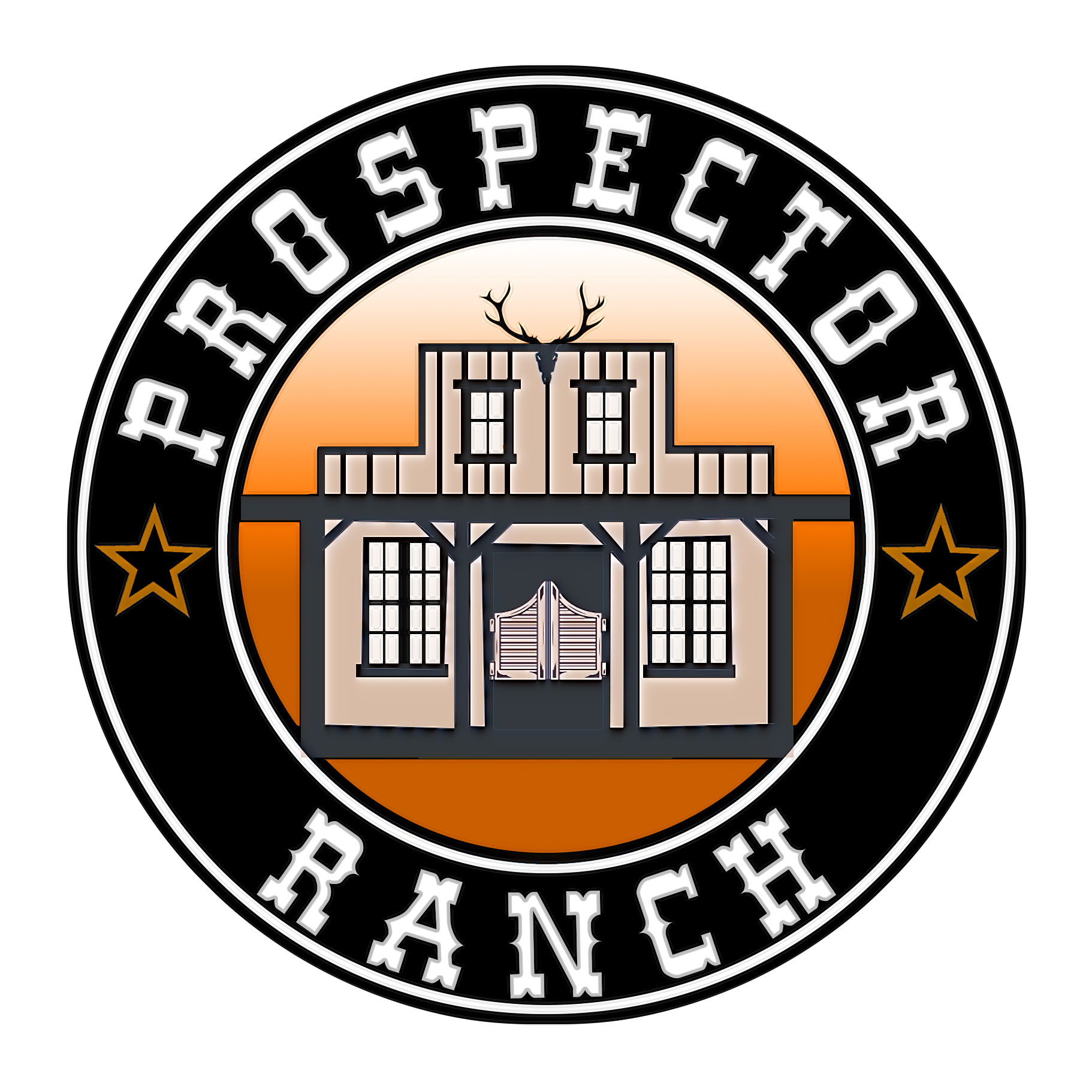
PHOTOGRAPHER
RANDALL SALVIN
STYLIST
SAM SPECTOR
GROOMING
ANDREA PEZZILLO
KELLY TOMLINSON
ASSISTANT: PHOTO: DYLAN GORDON, FASHION: FRED KIM
